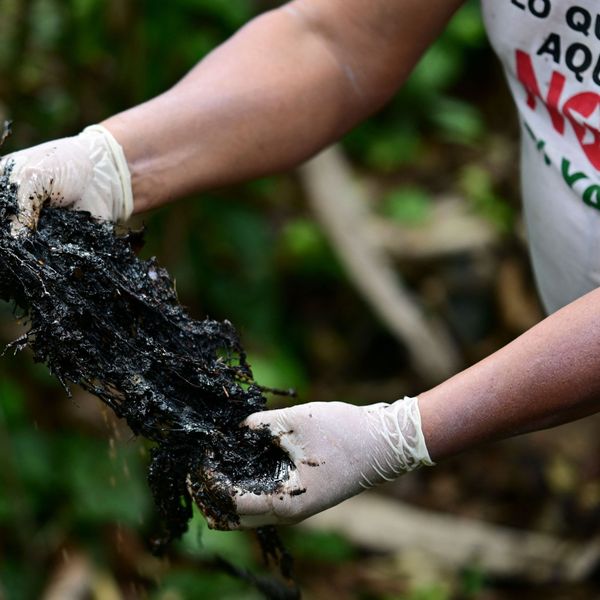Brazil has demanded that 17 Chevron and Transocean executives surrender their passports while they await the
outcome of criminal charges brought against them for a spill that took place off the coast of Rio de Janeiro last November. The company has also been sued for $11 billion in damages by a Brazilian federal prosecutor.
Chevron has issued a statement claiming the charges are "outrageous and without merit." "We have sought to perform our operations in full compliance with Brazilian laws and industry practices and to comply with all applicable licenses and authorizations," says a company press release issued Wednesday.
The jury is still out on the facts of the case. But it is hard to sympathize with a company that has played fast and loose with national justice systems in order to avoid paying compensation for toxic spills of immense proportions in the
Ecuador by Texaco, a company that Chevron merged with in 2001.
Between 1964 to 1992 Texaco admitted to dumping more than 16 billion gallons of toxic "water of formation" into the streams and rivers used by local inhabitants for their drinking water, decimating indigenous groups and causing dramatically increased rates of cancer, according to
a summary from Rainforest Action Network.
In 2002, Chevron asked for a trial in Ecuador to avoid a U.S. court battle. Eight years and 220,000 pages of evidence later, the courts ordered the company to pay $18.2 billion in damages. Chevron appealed but the Ecuadorean appellate court ruled against them on January 3, 2012. Now the company is attempting to have the judgement thrown out by a secret arbitration panel under a provision in the U.S. Ecuador Bi-Lateral Trade Agreement.
"Chevron won't pay to clean up the toxic oil waste it deliberately dumped in the Ecuadorian Amazon, which has resulted in a human health crisis for the people living in the region. But it will pay thousands to lobby state leaders and ambassadors to extend its extreme investor rights, and continue to evade justice elsewhere," said Ginger Cassady, campaign director at
Rainforest Action Network.
Transocean, which is one of the largest offshore drilling contractors, has also been in trouble over oil spills. The U.S. company, which is headquartered in Switzerland was implicated in the Deepwater Horizon explosion that killed 11 men on April 10, 2010. Approximately 4.9 million barrels of oil were spilled into the Gulf of Mexico which caused major damage to the local marine environment and the fishing and tourism industries.
A
Wall Street Journal review found that the company was involved in "three of every four incidents that triggered federal investigations into safety and other problems on deepwater drilling rigs in the Gulf of Mexico since 2008." The newspaper noted that Transocean has accounted for 24 of the 33 incidents investigated by the U.S. Minerals Management Service despite during that time owning fewer than half the Gulf of Mexico rigs operating in more than 3,000 feet of water.



